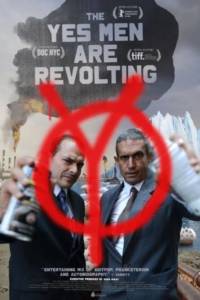In this summer of Mad Max, a quieter, gentler movie is now playing at the Sie Film Center. The Yes Men are Revolting, while seeming to zoom in on the immediate problem of climate change from the more general anti-corporatist shenanigans of previous films, is not simply “another Yes-men Production.” It is an allegory for what it is to be a environmental activist in the face of a conceivable cataclysm.

The documentary begins in 2009, when both Andy and Mike, after the sequel to their first film, are comfortable in their positions as instructors at The New School and RPI respectively. Andy is in his first long term relationship; Mike has a wife and two kids. The next hour and a half (covering three years) brings us to Ghana, Copenhagen, Scotland, Alberta, Seattle, and back to New York, and these travels represent moments in both personal autobiography and cultural odyssey as we all have moved in the interim into the truth of climate change. In this time, Andy’s boyfriend breaks up with him; Mike has moved his family to Scotland and their third child arrives, a source of obvious tension in the relationship between the two men. The Yes Men as entity experience their first arrest, a pending lawsuit (from the US Chamber of Congress), and continued media coverage of their disruptive actions. Among other events, they enter the Hudson River in the ridiculous-looking SurvivaBalls (seen in their last film) as the U.N. discusses climate change, coordinate with activists in Ghana to hold a fake (and impactful) press conference in which Canada gives billions of dollars to the African nations for the damage caused by the tar sands, and get defense contractors to stand and sing in a circle in celebration of a plan to eliminate fossil fuel dependency.
Interspersed within the moments of hilarity, however, are the brutal images of Alberta’s deforestation, reports of Ghanaian communities devastated by floods, sobering realizations about Shell’s attempts to drill in the arctic, and finally, the close-to-home ravages of Hurricane Sandy. In the footage after Sandy, the film comes together, as a young woman says “It’s like the Apocalypse,” with flames shooting up in the background and Mike and Andy confront their own despair and complicity (global travelers, three children) in these events. What, they wonder, is the point? And the answer, they discover, is not in what they alone can do, but in what many small and local disruptive direct actions can add up to. The answer is in positive community outcomes like “Occupy Sandy” that brought relief three days before the larger aid organizations could arrive.
The Yes-Men’s vision is one that sees the apocalypse but continues to try anyway, and in the process of trying, struggles to create a better future than the one envisioned for us. In the strength of the communities that come together to protest and rebuild in the rubble of the storms and in the height of the droughts lies the alternative to the tyrannical property owner who hoards all the water and enslaves the downtrodden. And for this, it is eleven dollars well spent.
By Rebecca Laroche
